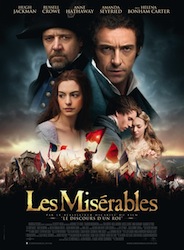 To borrow a lyric… I dreamed a dream where I loved this movie.
To borrow a lyric… I dreamed a dream where I loved this movie.
Sadly that dream did not come to pass, while this wasn’t a complete nightmare I do have some significant issues with how Les Miserables, one of my all time favorite musicals, made the transition from stage to screen.
My biggest complaint is with the direction and cinematography. Most of the movie is claustrophobic. I know director Tom Hopper, an Oscar winner for The King’s Speech, said he did the closeups to convey emotion. That might work on a limited scale, but the majority of the film is done with the camera basically inches from the actor’s face. It’s too close and unnecessary. Instead of a sweeping epic, the film felt constrained and I found myself wanting to see what was happening around the actors instead of being forced to stare at them.
Beyond the excessive closeups, there was something wrong in the pacing as well. I’ve seen Les Mis about a dozen times over the years–it was one of the first of the UK mega musicals I saw (I can’t remember if Les Mis or Evita came first, they happened within about six weeks of each other)–and it always seems to move it a good clip. Something about the movie made it seem strung out even though it was basically the same. Yes, there was a new song and there were some snips in some places and some additions in others, but it shouldn’t have affected the pace the way it did. It still clocked in at about two-and-a-half hours like the stage show does, but the film felt longer.
Another huge problem is Russell Crowe and his lack of a singing voice. Someone, I can’t remember who now, called him atonal. I thought that when I first heard the CD back on the Friday before Christmas and my opinion didn’t change seeing the movie. He acts the role of Javert fine, but his voice is just not up to the role of singing such powerful songs as “Stars” and his suicide soliloquy.
There were several things that I liked and made the movie worth the cost of admission (which is always an important thing):
- Overall, I liked the concept of the live singing and what it allowed the actors to do with their performances. In many cases it made the situation seem more gritty and real. I’d like to see a stage version make use of the vocal arrangements that are in the film. I think it would be interesting.
- In terms of the actors… I loved Anne Hathaway, although I feel like they’re using a different version of “I Dreamed a Dream” in the movie than in the trailer because she sounded bigger on film. Hugh Jackman got better with Valjean as the character aged. I’m guessing he was doing some character work there, but it got better as they went. Lovers Amanda Seyfried and Eddie Redmayne were solid and I liked how their trilly/verbratto-y voices blended. Aaron Tevit was a great Enjolras (although it was sad he got stuck with that wavy hair). I’ve never liked the Thénardiers, but Sacha Baron Cohen and Helena Bonham Carter put a good spin on the characters and I enjoyed them more in the film than any stage production I’ve seen.
- The closing sequence where Valjean gives his final words to Marius and Cosette and is visited by Fantine’s ghost was possibly my favorite sequence of the film.
- There’s a quick scene after the battles where Javert finds young Gavroche’s body and places a medal on it. That is a wonderful scene that humanizes Javert at just the right moment. This doesn’t exist in the stage production and was a nice addition for the film.
- It was a particularly great to see Colm Wilkinson, the original stage Valjean, as the bishop who delivers Hugh Jackman’s Valjean to a new life. It was good closure that he returned at the end of the film to receive Valjean into heaven.
- The battle sequences in the streets of Paris finally let the scope of the film open up a little bit and I liked how they made the lead up to the battle and the barricade battles play out.
I think it’s difficult to take a sing-through musical and bring it to film. Many songs in these types of shows are designed as internal monologue and that’s more of a stage technique than a film one. Of the big British musicals of the late 80s to do end up on film so far, I think both The Phantom of the Opera and Evita did it better than Les Mis. Both Phantom and Evita have their own issues, but as a complete package they are more enjoyable. If Cameron Mankintosh takes the plunge to make Miss Siagon into a movie, hopefully he’ll learn a few things from the Les Mis experience.
